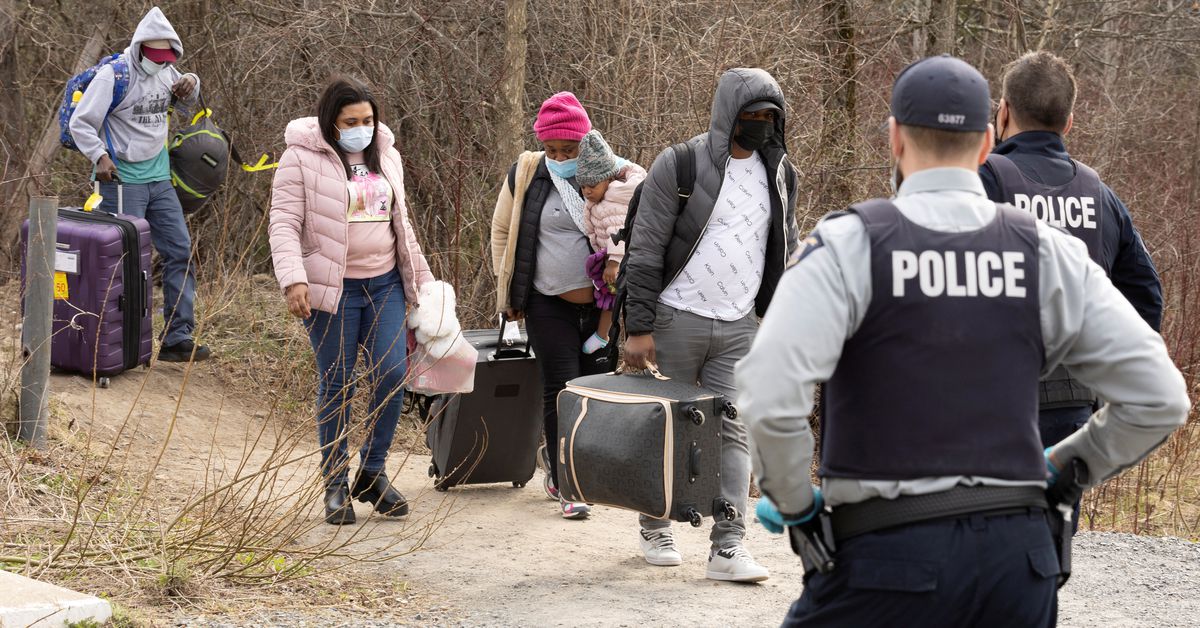
The article and caption image make the error of confusion immigrants and refugees
Immigrants are people we let in for strategic reason. Reasons like, eg, wage suppression, goosing the housing market, artificially inflating GDP and/or avoiding having to make hard decisions like investing in infrastructure and taxing the wealthy.
Refugees are people we take in for humanitarian reasons, like an environmental or political crisis in their homeland, or a legitimate fear of persecution and death. Not only is it a decent thing to do and absolutely table-stakes for being a card-carrying member of the human race, but if we ever go all Handsmaid’s Tale here I hope that other countries would reciprocate.
We shouldn’t be taking in more immigrants until we have the infrastructure to deal with it. We should be taking in refugees without question.
I agree, even if I’m an immigrant myself, Canada cannot accept 500k immigrants a year when we have no housing and in some place like Québec, fragile healthcare and education systems… No question for refugees, it’s the thing to do.

Reasons like, eg, wage suppression, goosing the housing market, artificially inflating GDP and/or avoiding having to make hard decisions like investing in infrastructure and taxing the wealthy.
Keeping our population reasonably young should be in there, too. And maybe helping them out of non-lethal but bad situations in the third world, if you’re the type of person that’s concerned about the people in question themselves.

Depends on the immigrants. When you’ve got many industries of Canada in critical crisis that’s impacting citizens (eg healthcare and homebuilding), focusing on immigrants with skills that we need more of (eg. nurses and electricians) just makes sense. The problem with that approach is the foot-dragging from certifying bodies in giving these people a pathway to Canadian papers.
I mean, if we don’t have enough food service workers or software developers… well, then more pay for our existing ones (disclaimer: I’m a coder). That mostly impacts the economics of those industries, not public and private services Canadians desperately need.
But if we don’t have enough doctors? Everybody feels that problem very directly.
edit: Personally I’m heavily pro-immigration overall from a human rights & economics perspective (freedom of movement is a good thing! This includes non-refugees!), but when we’re in an ever-deepening crisis about housing that is seriously harming our citizens and refugees it definitely makes sense to start talking about doing it more strategically.

The problem with that approach is the foot-dragging from certifying bodies in giving these people a pathway to Canadian papers.
No, the problem is 40+ years of not expanding training to keep up with population growth.
Every single year the number of residencies is maxed out and doesn’t get increased. We are short of nurses but people with qualifying grades get rejected from nursing programs because there isn’t enough space. And where’s the call to expand schooling capacity? Fucking crickets from all sides.

You see, training people would cost money, which would mean taxing the wealthy to pay for schooling, and paying the people we train once they enter the workforce.
Immigrants we can get, by comparison, for free. And frankly, we get the win-win of depressing wages for everyone.
It bugs me because I’m largely pro-immigration, or at least I was until I saw what the wealthy use it for.

“Mirage” is a very hot take, it implies that nothing is actually changing. It’s more like growing pains.
“If we want to do more immigration, fine, but let’s have a suite of policies” that increase infrastructure investment for “transit, housing, healthcare… schools,” said Chris Ragan, director of the Max Bell School of Public Policy at McGill University in Montreal and an adviser to the Conservative Finance Minister Jim Flaherty in 2009-10.
See, that’s how we should handle this. And for god’s sake let immigrants go into the field they were trained for. Doctors belong in hospitals, not the Tim Horton’s beside one.

We need more skilled workers, but not less immigration in general. The recent program to convert H1B-holders to Canada is a step in the right direction. A big problem is that Canada’s immigration policy is notoriously lax and allows for things like diploma mills and immigrants with zero income/10 million dollar houses.
Raise (property) taxes, clamp down on education, expand education funding, and attract foreign investment in something other than our real estate industry by stimulating the startup environment. Skilled and educated people moving to Canada is good for Canadians and good for the Canadian economy. Unskilled and uneducated people moving to Canada is not.
A big component of recent US GDP/capita growth is the technology boom. Canada is severely lacking in this category, even compared to our European counterparts.
I think the right skilled workers is the answer. You do know that Canada’s immigration policy is skewed to “skilled workers” typically (outside of the family migration qualifications). I have met plenty of skilled immigrants who are under-employed working outside of their qualifications here for whatever reason. Employers typically prefer Canadian or US work experience for instance. We have a shortage in construction workers and that’s partly contributing to the housing shortage on the supply side of things.
What’s also been a LONG RUNNING problem in Canada is the lack of productivity gains which this article sort of mentions. It’s something prior governments couldn’t tackle, and Trudeau can’t seem to tackle either.

Canada’s technology industry is dominated by giants, not startups. The jobs are stagnant. Meanwhile, a decent chunk of immigrants use backdoors (e.g. diploma mills) to get in.
We may have election soon? Remember to not vote for Trudeau to end this mirage! Have you seen rent price too?

Unless you’re planning to somehow elect Jagmeet, rent prices will get worse and faster if we get pipsqueak.

Singh has zero chance of getting elected and so the only real alternative is the Conservatives.
And they sure as hell are not going to handle this any better than Trudeau’s Liberals.


